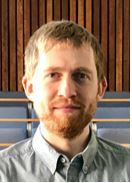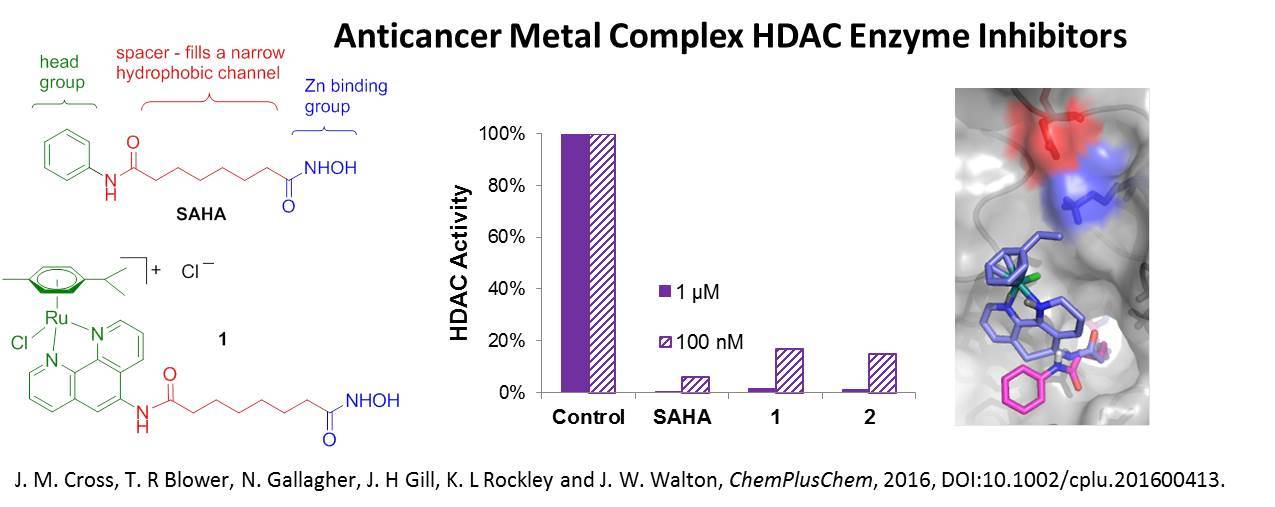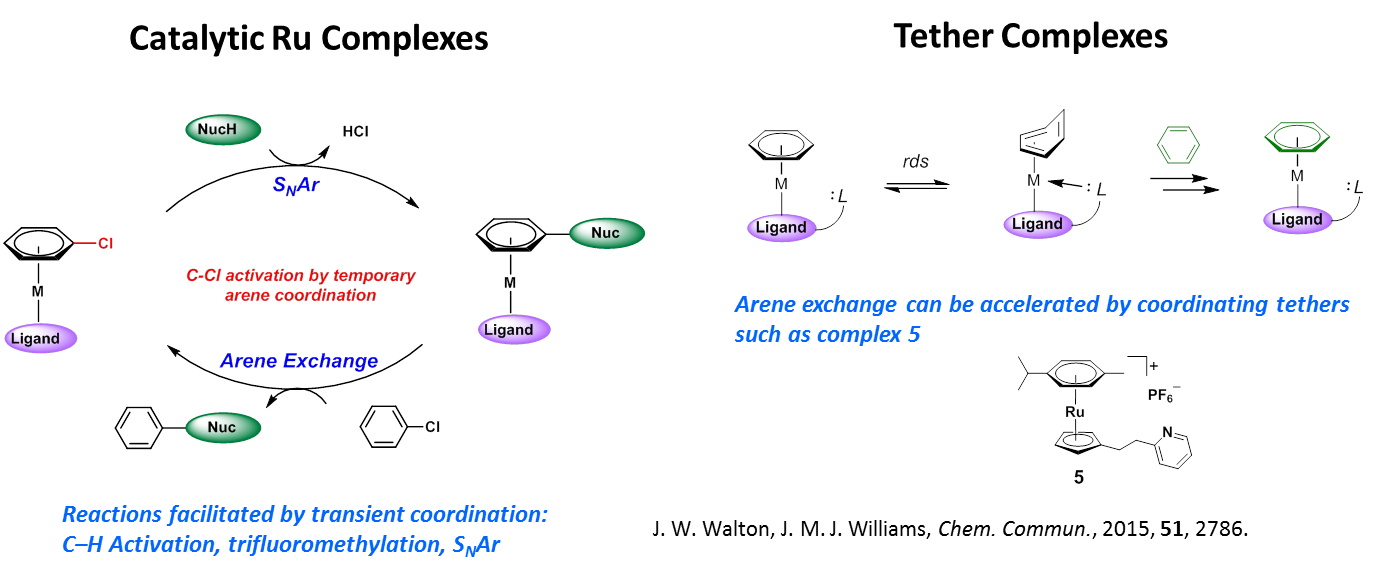Staff profile
Dr James Walton
Associate Professor

| Affiliation | Telephone |
|---|---|
| Associate Professor in the Department of Chemistry | +44 (0) 191 33 42109 |
Biography
James W. Walton completed his undergraduate degree at the University of Durham with First Class Honours. Under the supervision of Prof. David Parker, he completed a PhD entitled “Highly Emissive Europium Complexes”, funded by CISbio Bioassays, an immunoassay company based in the south of France. This was followed by postdoctoral work with Prof. Jonathan M. J. Williams at the University of Bath, developing ruthenium complexes for catalytic SNAr reactions and catalytic methods of amide synthesis. James began a lectureship at Durham in inorganic chemistry in January 2014.
Research
The research projects in the Walton group are linked through the design, synthesis and evaluation of organometallic complexes. Specific projects include organometallic platinum group metal complexes as therapeutic agents and ruthenium pi-arene complexes in catalysis. Click here to see the Walton group website
Piano stool metal complexes have been explored for several decades as potential anticancer agents. Histone Deacetylase (HDAC) enzymes are excellent targets for such therapeutic activity. We recently published the first examples of Ru(II) and Rh(III) piano stool HDAC inhibitors (Figure below, ChemPlusChem, 2016, DOI:10.1002/cplu.201600413). The novel complexes have anticancer activity comparable to the clinically used HDAC inhibitor SAHA. Our current work is exploring the design (using computational modelling) and synthesis of potent and isoform-selective HDAC inhibitors. We combine organic and inorganic synthesis to produce series of Ru, Os, Ir and Rh complxes. Analysis of these complexes include a range of enzyme binding assays, cytotoxicity studies and measurement of interactions with biomolecules using NMR, MS, IR and fluorescence spectroscopy. If you would like to discuss projects in this area, please contact james.walton@durham.ac.uk

We are also interested in the use of Ru(η6-arene)Ln complexes as catalysts (Figure below). Binding of arenes to Ru increases their reactivity towards several processes (SNAr, C–H activation, Trifluoromethylation etc.). However, the Ru–(η6-arene) bond is strong and a stoichiometric amount of Ru is required. Our goal is to develop systems in which the rate of arene dissociation/exchange is matched with the rate of arene reactivity, leading to a catalytic cycle. This is achieved through choice of ligand, Ln, and incorporation of tethers, lowering the activation barrier for dissociation. Read about our latest results in this area If you would like to discuss projects in this area, please contact james.walton@durham.ac.uk.

Opportunities
We are always interested in potential fellowship, postdoctoral, PhD, Masters and Erasmus applications. Contact Dr. James W. Walton with a CV to discuss potential positions available. Informal enquiries also welcome.
Research interests
- Catalysis
- Metal Complexes in Medicine
- Organometallic Chemistry
Publications
Chapter in book
- π-Coordinated arene metal complexes and catalysisWalton, J. W., & Wilkinson, L. A. (2018). π-Coordinated arene metal complexes and catalysis. In N. J. Patmore & P. I. Elliott (Eds.), Organometallic chemistry (pp. 125-171). Royal Society of Chemistry. https://doi.org/10.1039/9781788010672-00125
Journal Article
- Aggregation-induced emission switch showing high contrast mehanofluorochromism and solvatofluorochromism: Specifically detects HSO3− in bioimaging studiesDas, S., Pratim Das, P., Walton, J. W., Kheng Quah, C., Ghoshal, K., & Bhattacharyya, M. (2023). Aggregation-induced emission switch showing high contrast mehanofluorochromism and solvatofluorochromism: Specifically detects HSO3− in bioimaging studies. Dyes and Pigments, 217, Article 111413. https://doi.org/10.1016/j.dyepig.2023.111413
- Biotinylated selenocyanates: Potent and selective cytostatic agentsRoldán-Peña, J. M., Puerta, A., Dinić, J., Jovanović Stojanov, S., González-Bakker, A., Hicke, F. J., Mishra, A., Piyasaengthong, A., Maya, I., Walton, J. W., Pešić, M., Padrón, J. M., Fernández-Bolaños, J. G., & López, Óscar. (2023). Biotinylated selenocyanates: Potent and selective cytostatic agents. Bioorganic Chemistry, 133, Article 106410. https://doi.org/10.1016/j.bioorg.2023.106410
- Water-soluble copper pyrithione complexes with cytotoxic and antibacterial activityMishra, A., Djoko, K. Y., Lee, Y., Lord, R. M., Kaul, G., Akhir, A., Saxena, D., Chopra, S., & Walton, J. W. (2023). Water-soluble copper pyrithione complexes with cytotoxic and antibacterial activity. Organic & Biomolecular Chemistry, 21(12), 2539-2544. https://doi.org/10.1039/d2ob01224c
- Enolate SNAr of unactivated arenes via [(η6-arene)RuCp]+ intermediatesWilliams, L. J., Bhonoah, Y., & Walton, J. W. (2022). Enolate SNAr of unactivated arenes via [(η6-arene)RuCp]+ intermediates. Chemical Communications, 58(80), 11240-11243. https://doi.org/10.1039/d2cc02508f
- Human peripheral blood mononuclear cells targeted multidimensional switch for selective detection of HSO3− anionDas, S., Das, P. P., Walton, J. W., Ghoshal, K., Patra, L., Bhattacharyya, M., Mondal, T. K., & Thomas, S. (2022). Human peripheral blood mononuclear cells targeted multidimensional switch for selective detection of HSO3− anion. Dyes and Pigments, 198, Article 109966. https://doi.org/10.1016/j.dyepig.2021.109966
- Novel ruthenium complexes bearing bipyridine-based and N-heterocyclic carbene-supported pyridine (NCN) ligands: the influence of ligands on catalytic transfer hydrogenation of ketonesPiyasaengthong, A., Williams, L. J., Yufit, D. S., & Walton, J. W. (2022). Novel ruthenium complexes bearing bipyridine-based and N-heterocyclic carbene-supported pyridine (NCN) ligands: the influence of ligands on catalytic transfer hydrogenation of ketones. Dalton Transactions, 51(1), 340-351. https://doi.org/10.1039/d1dt03240b
- Comparative analysis of lanthanide excited state quenching by electronic energy and electron transfer processesParker, D., Fradgley, J. D., Delbianco, M., Starck, M., Walton, J., & Zwier, J. M. (2022). Comparative analysis of lanthanide excited state quenching by electronic energy and electron transfer processes. Faraday Discussions, 234, 159-174. https://doi.org/10.1039/d1fd00059d
- As nice as π: aromatic reactions activated by π‐coordination to transition metalsWilliams, L. J., Bhonoah, Y., Wilkinson, L. A., & Walton, J. W. (2021). As nice as π: aromatic reactions activated by π‐coordination to transition metals. Chemistry - A European Journal, 27(11), 3650-3660. https://doi.org/10.1002/chem.202004621
- FRET based ratiometric switch for selective sensing of Al3+ with bio-imaging in human peripheral blood mononuclear cellsDas, S., Pratim Das, P., Walton, J. W., Ghoshal, K., Patra, L., & Bhattacharyya, M. (2021). FRET based ratiometric switch for selective sensing of Al3+ with bio-imaging in human peripheral blood mononuclear cells. New Journal of Chemistry, 45(4), 1853-1862. https://doi.org/10.1039/d0nj05546h
- Anticancer Ruthenium Complexes with HDAC Isoform SelectivityCross, J., Blower, T., Kingdon, A., Pal, R., Picton, D., & Walton, J. (2020). Anticancer Ruthenium Complexes with HDAC Isoform Selectivity. Molecules, 25(10), Article 2383. https://doi.org/10.3390/molecules25102383
- Perfluorinated HDAC inhibitors as Selective Anticancer AgentsWalton, J. W., Cross, J. M., Riedel, T., & Dyson, P. (2017). Perfluorinated HDAC inhibitors as Selective Anticancer Agents. Organic and Biomolecular Chemistry, 15(43), 9186-9190. https://doi.org/10.1039/c7ob02339a
- C–H Activation of π-Arene Ruthenium ComplexesWilkinson, L. A., Pike, J. A., & Walton, J. W. (2017). C–H Activation of π-Arene Ruthenium Complexes. Organometallics, 36(22), 4376-4381. https://doi.org/10.1021/acs.organomet.7b00563
- Nucleophilic Trifluoromethylation of Electron-Deficient ArenesPike, J. A., & Walton, J. W. (2017). Nucleophilic Trifluoromethylation of Electron-Deficient Arenes. Chemical Communications, 53(71). https://doi.org/10.1039/c7cc05415g
- Anticancer RuII and RhIII Piano-Stool Complexes that are Histone Deacetylase InhibitorsCross, J., Blower, T., Gallagher, N., Gill, J., Rockley, K., & Walton, J. (2016). Anticancer RuII and RhIII Piano-Stool Complexes that are Histone Deacetylase Inhibitors. ChemPlusChem, 81(12), 1276-1280. https://doi.org/10.1002/cplu.201600413
- Pyridylphosphinate Metal Complexes: Synthesis, Structural Characterisation and Biological ActivityCross, J., Gallagher, N., Gill, J., Jain, M., McNeillis, A., Rockley, K., Tscherny, F., Wirszycz, N., Yufit, D., & Walton, J. (2016). Pyridylphosphinate Metal Complexes: Synthesis, Structural Characterisation and Biological Activity. Dalton Transactions, 45(32), 12807-12813. https://doi.org/10.1039/c6dt01264g
- EuroTracker® dyes : design, synthesis, structure and photophysical properties of very bright europium complexes and their use in bioassays and cellular optical imagingButler, S., Delbianco, M., Lamarque, L., McMahon, B., Neil, E., Pal, R., Parker, D., Walton, J., & Zwier, J. (2015). EuroTracker® dyes : design, synthesis, structure and photophysical properties of very bright europium complexes and their use in bioassays and cellular optical imaging. Dalton Transactions, 44(11), 4791-4803. https://doi.org/10.1039/c4dt02785j
- Catalytic SNAr of unactivated aryl chloridesWalton, J., & Williams, J. (2015). Catalytic SNAr of unactivated aryl chlorides. Chemical Communications, 51(14), 2786-2789. https://doi.org/10.1039/c4cc07116f
- Comparative analysis of conjugated alkynyl chromophore-triazacyclononane ligands for sensitized emission of europium and terbiumSoulié, M., Latzko, F., Bourrier, E., Placide, V., Butler, S. J., Pal, R., Walton, J. W., Baldeck, P. L., Le Guennic, B., Andraud, C., Zwier, J. M., Lamarque, L., Parker, D., & Maury, O. (2014). Comparative analysis of conjugated alkynyl chromophore-triazacyclononane ligands for sensitized emission of europium and terbium. Chemistry - A European Journal, 20(28), 8636-8646. https://doi.org/10.1002/chem.201402415
- Emissive europium complexes that stain the cell walls of healthy plant cells, pollen tubes and rootsPalmer, A. J., Ford, S. H., Butler, S. J., Hawkins, T. J., Hussey, P. J., Pal, R., Walton, J. W., & Parker, D. (2014). Emissive europium complexes that stain the cell walls of healthy plant cells, pollen tubes and roots. RSC Advances, 4(18), 9356-9366. https://doi.org/10.1039/c3ra45426f

